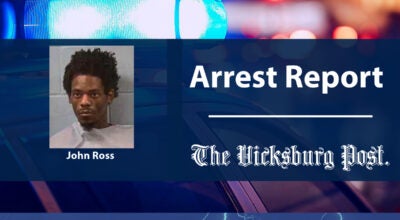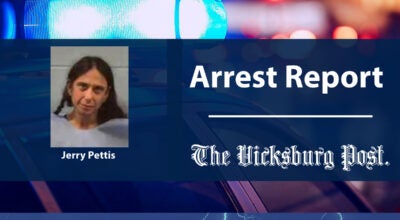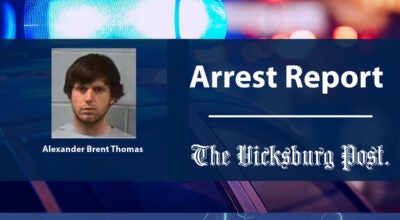Engineer recalls escaping Soviet rule
Published 12:00 am Monday, August 20, 2001
CHARLES CSOBOTH sits in his temporary Vicksburg home on Chambers Street.(The Vicksburg Post/MELANIE DUNCAN
[08/19/01] Charles Csoboth had been jogging with his co-workers from the Corps of Engineers’ Vicksburg District for months when, curious about his slight accent, they gave him his opportunity.
“Hey, Charles,” one of them asked, “what kind of name is Csoboth?”
It’s Hungarian, Csoboth told them, but he didn’t end the conversation at that. He never does.
Short questions about Csoboth’s nationality tend to elicit exhaustive answers about how he and his family escaped from Hungary in 1956 to avoid death at the hands of “godless Stalinists,” how they made it to the United States by responding to a strange question from an immigration official, and how, once here, they found a house and jobs waiting for them while other refugees languished in cramped military bases.
It’s a story that Csoboth, 53, says should prove the power of God to the most entrenched atheist, one that impressed First Baptist Church Pastor Eric Thomas so much that he yielded his pulpit to the Hungarian during the Cherry Street congregation’s morning services last Sunday.
“God wants to do in all people’s lives what He has done for Charles,” Thomas said.
A mechanical engineer who lived in Vicksburg from February as a participant in a Corps leadership development program, Csoboth went home to Wilmington, Del., on Thursday. But one of his co-workers said his story won’t be forgotten.
“It’s a great example of how God works in people’s lives,” said Jeff Artman, an engineer at the Vicksburg District and running friend of Csoboth’s.
Jimmy Waddle, another District engineer, said he thought the story was too good to be true.
“I was like, What’s the punchline?'” Waddle said. “I said I was going to throw him in my pool it was so incredible.”
The Csoboths had stayed in their native land at all costs, even moving west from Transylvania, their ancestral home, when that region was ceded from Hungary to Romania at the end of World War II.
But 1956 was different. Charles Csoboth’s father, Karoly, a federal railroad official, did not participate in the anti-Soviet revolts that swept Hungary that autumn, but his two older children, Frank and Valerie, did.
“They were students, and almost all the students in Hungary wanted to leave” after Soviet tanks rolled into the country in early November to kill the revolution in its cradle, said Charles Csoboth, then 9, the youngest of Karoly’s children.
And so, disguised in heavy peasant clothes, the Csoboths left their hometown in late November for the Austrian border. Karoly Csoboth went to his job on the day of the escape and joined them later on bicycle.
With peasant guides they had hired, the Csoboths and about 12 other people arrived at the Austrian-Hungarian border as winter descended on the deep woods and furrowed fields of Eastern Europe.
At times, Csoboth said, the weather and the land seemed as formidable as Soviet troops in blocking the Hungarians’ path to freedom.
“I think my toes were the only ones that didn’t turn black and blue, because I was riding on somebody’s shoulders,” Csoboth said. “Different people were twisting their ankles and tripping over limbs and shrubs all the time. I didn’t see Blair Witch,’ but I imagine it was a lot like that.”
And some of the refugees, lost and confused in between trees and snowbanks, didn’t make it past the border. But, with the aid of a compass that Charles Csoboth had taken with him on a whim from his house in Hungary, the Csoboths made it to Austria.
“If I didn’t have the compass, who knows where I would be today?” Csoboth said, his words the only sound breaking the silence that envelops his Chambers Street rental house on a weekday afternoon. “My father had been to work that day. Imagine how it would have looked if he had turned up at a border crossing that night. Deportation, death, who knows?”
The worst fate that awaited the Hungarians across the border was bad food, Csoboth said.
Ensconced in a castle in the Austrian countryside, Csoboth’s mother, Irene, and other refugees took over the kitchen.
“They wanted Hungarian food, not the stuff the Austrians were giving us,” Csoboth said.
Each family had to decide where in the free world they wanted to go once they arrived in either Salzburg or Munich in early December dates and places blur together in Csoboth’s narrative, a consequence of the short time frame in which so many significant events occurred.
“We could have gone to England, West Germany, anywhere,” Csoboth said.
They chose the United States, a country they had heard about only on Radio Free Europe broadcasts.
“It was like a dream place,” Csoboth said.
And, for some refugees, getting to the United States was as fantastic a prospect as some of their wilder dreams. There were seemingly innumerable reams of paperwork to complete, long lines to be processed by unfriendly bureaucrats.
But the Csoboths got to skip almost all the waits.
“A big official came to the lines one day and shouted, All Protestants step to this side.’ We were the only people that complied,” said the Presbyterian Csoboth, “because most people thought it was a trick for some people to get ahead of others in line.”
It wasn’t a trick. The Csoboths were immediately processed by an immigration official and set to fly into New York City by Christmas 1956.
They were greeted in America by the lights of the season, the red- and green-bedecked shops that were forbidden to exist in Stalinist lands.
“The whole city seemed like a carpet of brightness,” Csoboth said.
He has drearier memories of Camp Kilmer, the New Jersey military base where the immigrants lived. There were cramped bedrooms separated only by bedsheets, as well as more long lines and paperwork.
“We felt despondent,” Csoboth said. “We were total strangers here. We knew nobody.”
More accurately put, the Csoboths didn’t think they knew anyone in the United States.
The day after Christmas, Karoly Csoboth went upstairs in a base building to buy a bus ticket. He came back with a house and a job.
“My father had met a man in the building who asked him if he knew him,” Csoboth said. “It turns out they had been classmates 20 years earlier at the University of Budapest, and the man was at the base to find a Hungarian family for his church to sponsor.”
The man, Laszlow Salamon, also had the authority to offer Karoly Csoboth and his son, Frank, both trained engineers, two engineering jobs near Philadelphia.
“He had exactly the right number,” Csoboth says. “Not one, not three. Two. Only God could have arranged that.”
And so Charles Csoboth has lived in the Philadelphia metro area since Christmas 1956.
He became an engineer like his father and brother and joyfully received his first son on Oct. 23, 1976 the anniversary of the Hungarian revolution as well as the U.S. Bicentennial. With almost as much joy, he watched Communism die in Eastern Europe in the late 1980s and early 1990s. “The Lord was at work there,” he said.
Csoboth believes God is also at work every time someone queries him about his uncommon name.
“My story is a demonstration of his power,” Csoboth said. “He wants people to know.”





